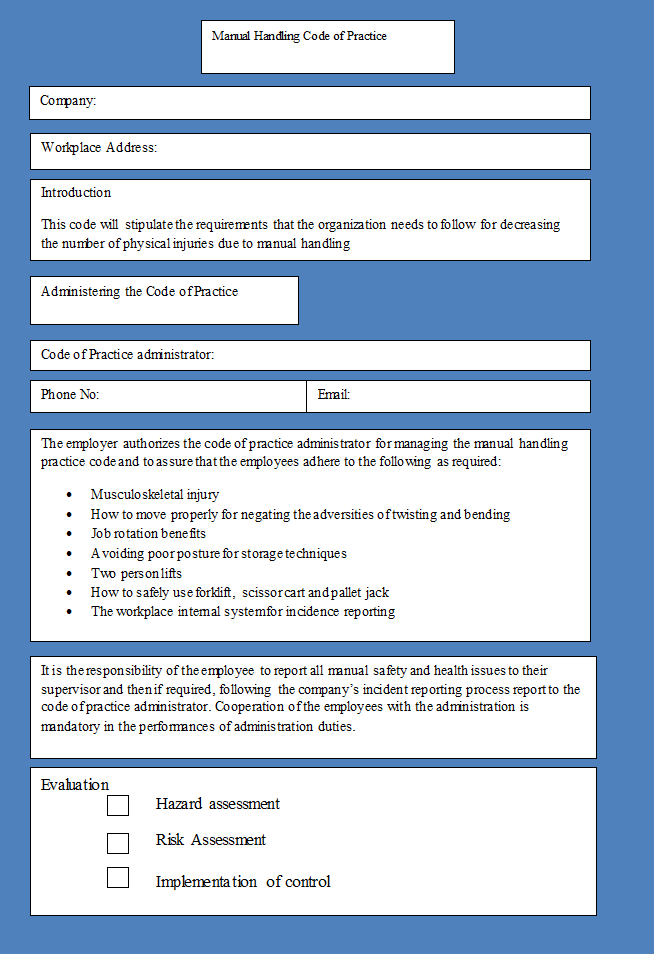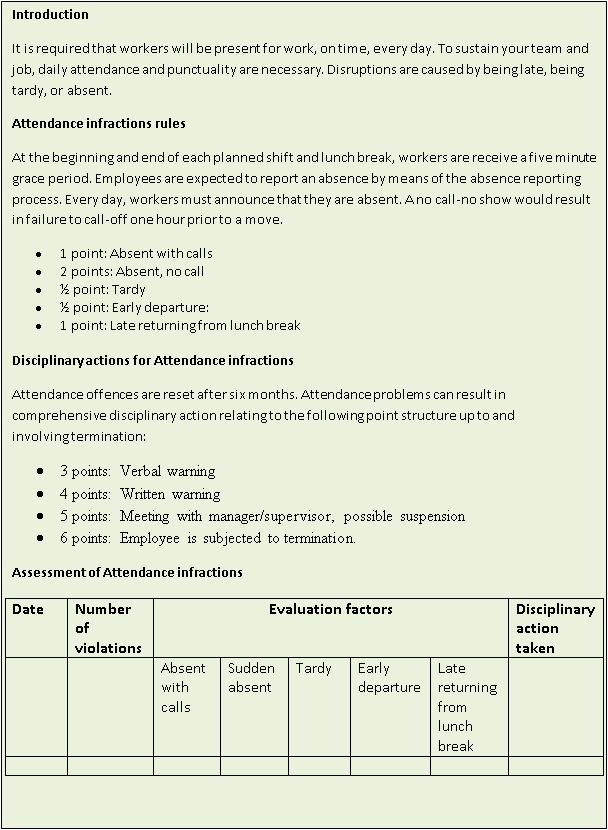Business Management Assignment: Managing Document Design & Development
Question
Task:
Prepare a business management assignment presenting six business templates and discuss their implementation within the organization.
Answer
Introduction
The use of business plan plays as a major part in improving the organizational performance (McKeever, 2016). The business management assignment report will identify six templates and will highlight their implementation within the organization. The report will shed light on the monitoring factors for evaluating the efficiency of template.
Training Feedback Evaluation template
|
Training Feedback Evaluation Form |
|||
|
Date: |
Course Title: |
||
|
Name: |
Trainer: |
||
|
Excellent |
Good |
Fair |
|
|
Rating the quality of the provided instruction |
|
|
|
|
Stating the objectives of the training by the presenter |
|
|
|
|
Presenter's capacity of keeping the session interesting |
|
|
|
|
Overall rating of the presenter |
|
|
|
|
Extent to which the program accommodated your background |
|
|
|
|
Efficiency of the handouts |
|
|
|
|
Convenience of the location |
|
|
|
|
What was the most interesting thing you have learned in the course? |
|||
|
|
|||
|
What was the least interesting thing you have learned in the course? |
|||
|
|
|||
|
Was the duration of the presentation adequate for the topic? |
|||
|
|
|||
|
What would have made the session more effective? |
|||
|
|
|||
|
Yes |
No |
||
|
The knowledge and skills gained from this training session will be useful for my job |
|
|
|
Table: Training Feedback Evaluation template
(Source: Learner)
The training feedback evaluation form will be distributed among the employees who have just completed the training session. The trainees have to rate the adequacy of training session and answer open-ended questions about the experience of training session. The responses from the employees should be gathered within a week after the completion of the training. The training evaluation form should be updated as a Google spreadsheet within the following week and shared with the HR manager via e-mail access. The response from the section “What would have made the session more effective” should be considered while developing the next training plan and in turn improve the use of this template. Hence, the analysis explains the manner in which training evaluation form will be implemented. It has been understood that the gathering feedback from employees about the training programs helps in improving the future training session (Sparr et al., 2017).
Training plan template
|
Training task/Topic |
Mode of training |
Provider |
Training Hours |
Expected Completion date |
Status |
Capability level |
|
|
|
|
|
|
|
|
|
|
|
|
|
|
|
|
|
|
|
|
|
|
|
|
|
|
|
|
|
|
|
|
|
|
|
|
|
|
|
|
|
|
|
|
|
|
|
|
|
|
|
|
|
|
|
|
Table: Training plan template
(Source: Learner)
The template will be provided to the training manager within the HR team. The template has to be filled by the training manager before commencing a training session and upload the template on an excel spreadsheet. The spreadsheet is shared with the HR manager as an attachment on a daily basis. The mode of training is to be filled by considering on-job or off-job training. The provider columns require the input of the trainer’s name. The training status highlights if the training session is completed or in progress. Thus, it explains the manner in which the spreadsheet is to be implemented within the organization. The training plan is to be monitored by the KPI, capability level which comprises of Level1, Level 2, identifies if the training support is adequate to meet the required level. Hidayat and Budiatma (2018) have supported that the provision of adequate training improves employee performance.
Code of Practice Template

Table: Code of Practice template
(Source: Learner)
The template is handed over to the Practice administrator and the Practice administrator distributes it to the employees, involved in the warehouse operation as a mail attachment. The employee has to fill up the template on a regular basis before commencing their work and has to send the completed document to the Practice administrator who reviews the Hazard assessment evaluation. Thus, it is reflects on how the Code of Practice template has to be implemented. The template is to be monitored by the evaluation and controls factors of Hazard assessment. The control factor will identify the injury index by calculating the ratio of Incident frequency to all incidents. Amiri et al. (2017) have supported that the use of hazard assessment is necessary to improve the working conditions of the employees.
Hazard/Risk identification template
|
Hazard Identification |
||||||||||||||
|
The section is to be completed for every applicable task |
||||||||||||||
|
Administrator: |
Date of assessment: |
|||||||||||||
|
Person(s) at risk: |
||||||||||||||
|
Task name/description: |
||||||||||||||
|
|
ü |
|
Actual |
Objective |
||||||||||
|
Injury analysis |
Incident frequency |
|
|
|||||||||||
|
Lost time |
|
|
||||||||||||
|
All incidents |
|
|
||||||||||||
|
Number of incidents |
|
|
||||||||||||
|
Comments: |
||||||||||||||
|
Employee or supervisor concerns as reported through the incident reporting process |
List of concerns: |
|||||||||||||
|
Body Discomfort Index |
Comments: |
|||||||||||||
|
Note: Any Discomfort Survey result over “5” should be considered a high risk for injury. |
||||||||||||||
|
Body Part |
Neck |
Left Shoulder |
Right Shoulder |
Left Elbow |
Right Elbow |
Left Wrist |
Right Wrist |
Back |
Left Knee |
Right Knee |
||||
|
Average Discomfort |
Actual |
|
|
|
|
|
|
|
|
|
|
|||
|
Objective |
|
|
|
|
|
|
|
|
|
|
||||
|
||||||||||||||
Table: Hazard/Risk identification template
(Source: Learner)
The Hazard identification template is to be distributed among the employees and the employee fills it up and sends it to Practice administrator. The List of Concern section of the Hazard identification template identifies the issues that the employees are facing in terms of health and safety and provides the organization with the critical information about the protective measures that needs to be taken for preventing major work-related accidents. Hence, it highlights the manner in which the template is to be implemented. The Body Discomfort Index has been stipulated to monitor the effectiveness of the template as it will highlight the efficacy of the template in reducing work related accidents. Galdino, et al. (2017) have identified that identifying hazards is important for decreasing the number of fatal workplace injuries.
Dress code policy template
|
Introduction |
|||||
|
The dress code policy is aimed to assist us all provide our clients and colleagues with a clear professional appearance. Our participation reflects on the organization and ourselves. The aim is to ensure that we keep a strong image and not to offend clients, customers, or peers. |
|||||
|
Policy applicable to: |
|||||
|
The [company name] dress code policy applies to all the employees |
|||||
|
Dress Code Policy: |
|||||
|
Unless the day's duties demand otherwise, workers are required to dress in casual attire. |
|||||
|
Employees must always have a professional, clean appearance. Employees are supposed to be well-groomed and should wear clothing that is free of holes, tears or other signs of wear. |
|||||
|
Clothing with improper or offensive patterns or stamps is not permitted. |
|||||
|
Clothing is not meant to be too revealing. |
|||||
|
It exempts clothing and grooming styles determined by religion or ethnicity. |
|||||
|
Dress Code Violations: |
|||||
|
Repeated violations or breaches that have serious consequences can lead to the taking of disciplinary measures up to and including termination |
|||||
|
Dress code assessment |
|||||
|
Date |
Number of violations |
Evaluation factors |
Disciplinary action taken |
||
|
revealing |
offensive patterns |
clean appearance |
|||
|
|
|
|
|
|
|
Table: Dress code policy template
(Source: Learner)
The template will be provided to the HR manager and a legal version of this segment will be integrated within the employee contract in order to maintain authenticity and accountability. It is expected that managers or superiors will notify workers when they violate the dress code. Employees in breach are required to resolve the problem immediately (Miernicka, 2019). In order to change clothing, this will require having to leave work. The number of violations column will account for the incidences that are associated with dress code infringement.
Attendance Policy Template

Table: Attendance Policy Template
(Source: Learner)
The template will be provided to the HR manager and a copy of this template will also be introduced within the contract agreement. Hence, it highlights the manner in which the template is to be deployed within the organization. The Evaluation factors of Absent with calls, Sudden absent, Tardy, Early departure and Late returning from lunch break will be used to monitor the efficiency of the plan.
Conclusion
The report has been exemplary in identifying the six templates and the manner in which they are to be implemented within the organization. From the report, it has been identified that the Training Feedback Evaluation and Attendance Policy template is extremely important.
Reference List
Sparr, J.L., Knipfer, K. and Willems, F., 2017. How leaders can get the most out of formal training: The significance of feedback?seeking and reflection as informal learning behaviors. Human resource development quarterly, 28(1), pp.29-54.
Hidayat, R. and Budiatma, J., 2018. Education and job training on employee performance. International journal of social sciences and humanities, 2(1), pp.171-181.
Amiri, M., Ardeshir, A. and Zarandi, M.H.F., 2017. Fuzzy probabilistic expert system for occupational hazard assessment in construction. Business management assignment Safety science, 93, pp.16-28.
Galdino, A., Santana, V.S. and Ferrite, S., 2017. Quality of the record of data on fatal workplace injuries in Brazil. Revista de saude publica, 51, p.120.
Miernicka, I., 2019. Chapter twenty dress code in a workplace as a challenge for labour law relationships. Health at Work, Ageing and Environmental Effects on Future Social Security and Labour Law Systems, p.434.
McKeever, M., 2016. How to write a business plan. Nolo.












